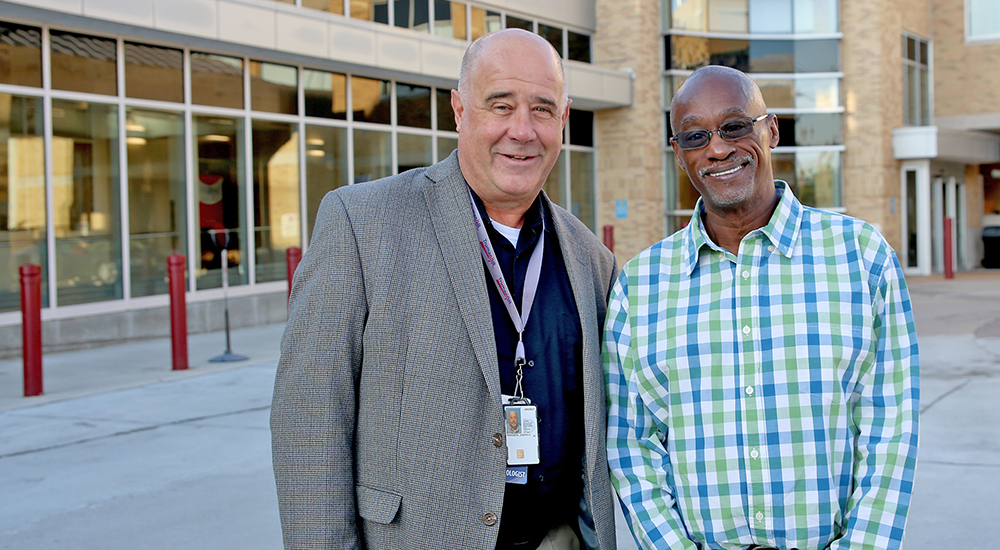United States Army Veteran Tony Fife-Patterson started smoking when he was 17 because “the cool guys in the neighborhood were doing it, and I wanted to fit in.” Eventually, he settled in to a pack a day habit, and never considered that he might be addicted to nicotine. Occasionally, someone would tell him he ought to quit, but it only made him want to smoke more.
A couple of years ago, Tony’s daughter called him about his 5-year-old grandson who was crying after watching a “Truth Ad” on television. The ad is part of a national campaign to eliminate teen smoking. Tony’s grandson never liked how smoking made Tony smell, but the advertisement made him worry about how smoking could hurt his grandfather’s health.
Although Tony began contemplating his cigarette smoking, he still didn’t think he had a problem. Yet a few days later, after lighting a cigarette, Tony had an epiphany.
“At that moment, I realized I really was getting tired of this habit,” Tony said. “It had become something that no longer was fun.”
At his next VA appointment, Tony asked his provider about quitting and learned about Truman VA’s “Thinking About Quitting?” program.
“This really DOES control me!”
Tony agreed to attend the program’s orientation class. At first, he had doubts; however, once he learned that his smoking was an addiction, he knew he didn’t want tobacco to control him.
“Wait a minute,” Tony thought. “This really DOES control me!”
The realization that he was controlled by cigarettes offended him and he was determined to do something about it.
Tony enrolled in Truman VA’s Quit program with other Veterans who wanted to quit tobacco. The first three classes helped Tony develop a personal plan to manage the physical, psychological and habit parts of his smoking addiction. He also learned how to get through urges to smoke without giving in. On the program’s “Quit Day,” Tony found it was helpful to quit with other motivated Veterans. The final three classes focused on lifestyle changes to help him remain tobacco-free and avoid a relapse.
In the photo above, proud “Thinking About Quitting” graduate Tony poses with Joseph Hinkebein, Ph.D., Truman VA psychologist and tobacco cessation coordinator.
It’s now a year-and-a-half since Tony’s “Quit Day,” and he remains tobacco-free.
Tracks progress…and SAVINGS…with app
As part of his success, Tony uses a quit smoking smart phone app to track how long he has been tobacco-free and how much money he has saved since quitting. He’s saved almost $1,400 so far.
More importantly, Tony loves the tobacco-free lifestyle. His sense of taste and smell has improved, and he no longer gets complaints from his grandson about smelling like smoke.
“I didn’t realize how bad I smelled, but now I get it,” Tony said.
Most of all, he is proud to no longer be controlled by cigarettes. While the thought of smoking still crosses his mind every now and then, when stressed, he reminds himself, “I don’t need a cigarette to cope with stress anymore!”
Tony tries to lead by example and never “lectures or nags” those who still smoke. He just wants other Veterans to know that they can quit when they are ready to do it for their own reasons. He encourages Veterans to attend the “Thinking About Quitting” orientation class to learn how to successfully quit. The program provided education and support to help him be successful, but Tony gets all the credit.
“I never thought I could do this,” Tony said. “But I did it. It is something I am immensely proud of!”
To learn more about your options for quitting, talk with your VA provider or visit www.publichealth.va.gov/smoking/quit_smoking.asp.
Article courtesy the Health Promotion Disease Prevention Program.
Topics in this story
More Stories
Veteran Byron Potier weighed almost 300 pounds and was tired and lethargic. He was the perfect candidate for gastric sleeve surgery.
How much do you know about VA care, benefits and services? Don’t miss out on what you've earned—check out the "2025 VA Federal Benefits Guide for Veterans, Dependents, Survivors, and Caregivers" handbook to learn more.
Feeling stressed? Your breath can help you relax and focus. Take 3 minutes to reset and prioritize your well being for this week's #LiveWholeHealth practice.






